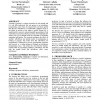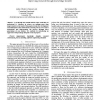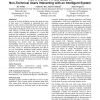104
Voted
ITICSE
2004
ACM
15 years 6 months ago
2004
ACM
Learning to program is a unique experience for each student, and it is not fully understood why one person in an introductory programming course learns to program better and more ...
96
Voted
ICRA
2005
IEEE
15 years 6 months ago
2005
IEEE
– Effective communication between a person and a robot may depend on whether there exists a common ground of understanding between the two. In two experiments modelled after huma...
102
Voted
SIGDOC
2006
ACM
15 years 6 months ago
2006
ACM
We report on the development of a tool which supports software programmers in programming to an interface by providing just in time (JIT) solutions. The development of the tool wa...
ICSEA
2006
IEEE
15 years 6 months ago
2006
IEEE
— It is through our mental models of the world that we understand it. Advances in science are nothing more than improvements to the model. This paper presents the development and...
86
Voted
FC
2007
Springer
15 years 7 months ago
2007
Springer
1 2 There is a critical need in computer security to communicate risks and thereby enable informed decisions by naive users. Yet computer security has not been engaged with the sc...
HICSS
2008
IEEE
15 years 7 months ago
2008
IEEE
1 Shared understandings are important for software development as they guide to effective individual contributions to, and coordination of, the software development process. In thi...
109
Voted
CHI
2007
ACM
16 years 1 months ago
2007
ACM
In order to develop intelligent systems that attain the trust of their users, it is important to understand how users perceive such systems and develop those perceptions over time...



